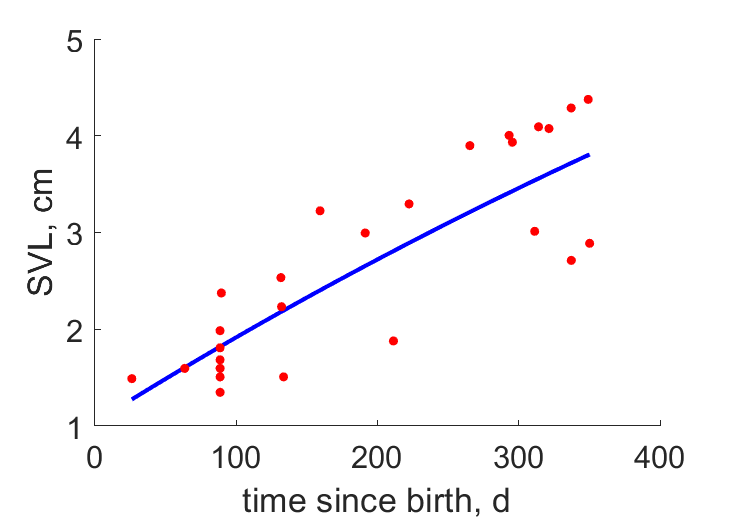Predictions & Data for this entry
| Model: std | climate: Am, Af | migrate: | phylum: |
| COMPLETE = 2.4 | ecozone: TN | food: biCi | class: |
| MRE = 0.102 | habitat: jiTf | gender: Dg | order: |
| SMSE = 0.021 | embryo: Tns | reprod: O | family: |
Zero-variate data
| Data | Observed | Predicted | (RE) | Unit | Description | Reference |
|---|---|---|---|---|---|---|
| ab | 63 | 49.61 | (0.2125) | d | age at birth | amphibiaweb |
| am | 1.278e+04 | 1.277e+04 | (1.046e-05) | d | life span | ADW |
| Lb | 0.95 | 1.036 | (0.09071) | cm | SVL at birth | amphibiaweb |
| Lp | 7.8 | 7.798 | (0.0003158) | cm | SVL at puberty for females | guess |
| Lpm | 5 | 5 | (2.101e-05) | cm | SVL at puberty for males | guess |
| Li | 10 | 11.64 | (0.1636) | cm | ultimate SVL | amphibiaweb |
| Wwb | 0.05 | 0.05369 | (0.07377) | g | wet weight at birth | amphibiaweb |
| Wwi | 78.2 | 76.03 | (0.02773) | g | ultimate wet weight | EoL |
| Ri | 0.1781 | 0.178 | (0.0004669) | #/d | maximum reprod rate | amphibiaweb |
Uni- and bivariate data
| Data | Figure | Independent variable | Dependent variable | (RE) | Reference |
|---|---|---|---|---|---|
| tL |  | time since birth | SVL | (0.1717) | BillBrin1998 |
Pseudo-data at Tref = 20°C
| Data | Generalised animal | Bolitoglossa mexicana | Unit | Description |
|---|---|---|---|---|
| v | 0.02 | 0.01525 | cm/d | energy conductance |
| kap | 0.8 | 0.9267 | - | allocation fraction to soma |
| kap_R | 0.95 | 0.95 | - | reproduction efficiency |
| p_M | 18 | 19.32 | J/d.cm^3 | vol-spec som maint |
| k_J | 0.002 | 0.002 | 1/d | maturity maint rate coefficient |
| kap_G | 0.8 | 0.8021 | - | growth efficiency |
Discussion
- Males are supposed to differ from females by E_Hp only
Facts
- Direct divelopment, reproduction is terrestrial; highly arboreal (Ref: amphibiaweb)
Bibliography